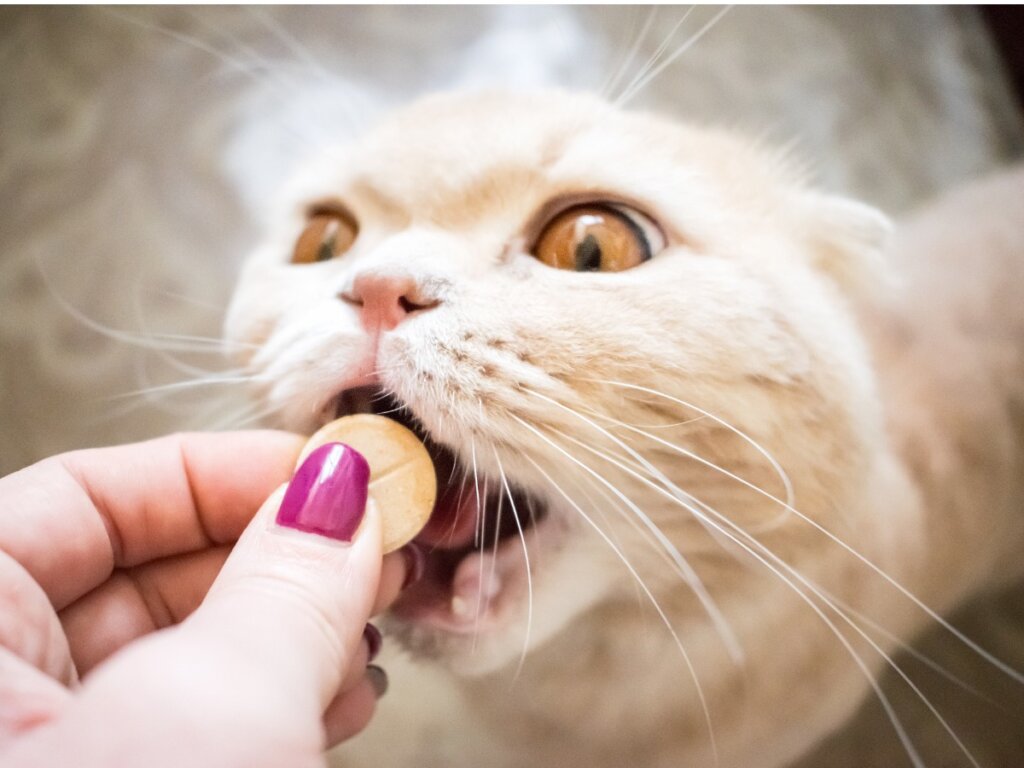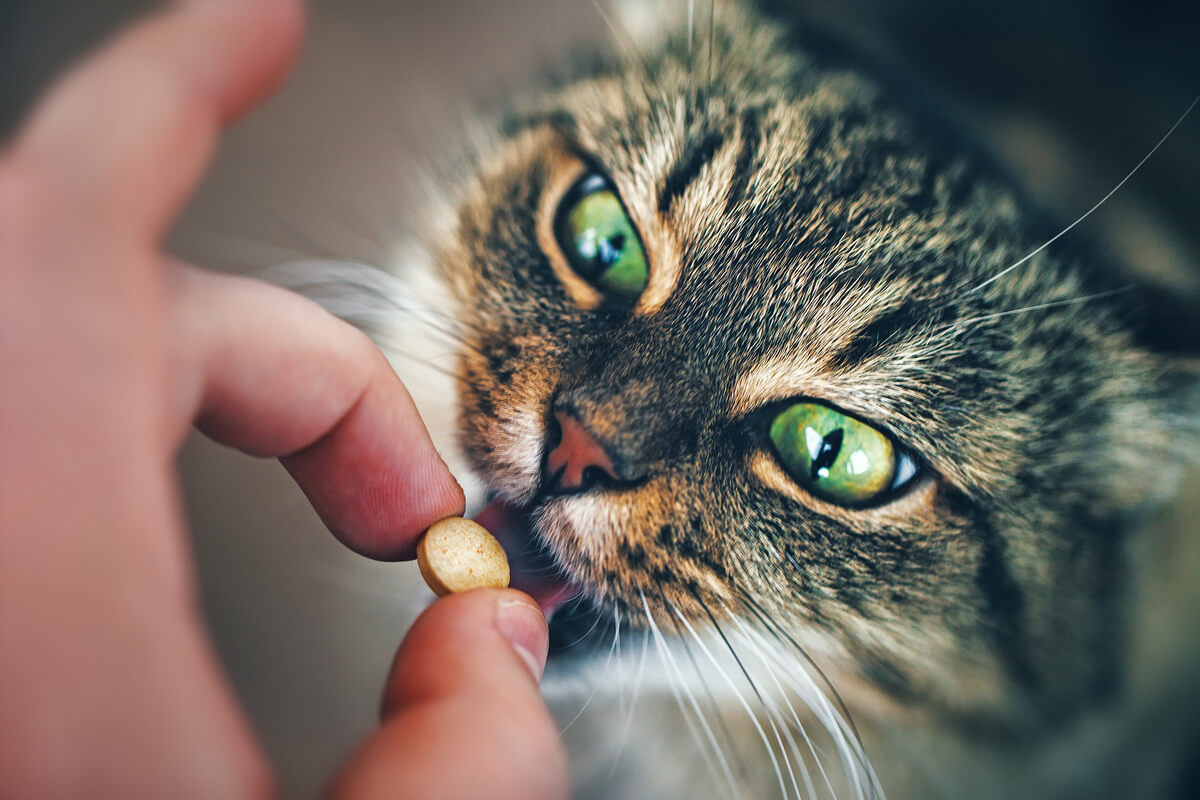Nutritional Supplements for Cats
Providing cats with nutritional supplements is a growing trend. These aren't for all cats though - read on to understand when they don't need them.

The consumption of nutritional supplements is very common among humans, but it can also be extended to domestic cats. Of course, it will be necessary for you to consult with your trusted veterinarian, because this supplementation isn’t always necessary.
Nutritional supplements for cats are usually made from 100% natural components. Their objective, as the name implies, is to supplement the pet’s daily diet. Depending on the brand, these can come in tablets, syrups, or capsules. In the event that your cat requires them, the dose should always be guided by a professional recommendation.
How to know if a cat needs supplements in its nutrition
First, to identify if your cat needs supplements in its nutrition, you need to monitor its behavior. If you observe that the cat has lost its appetite, that it’s ill, is becoming thinner, or its hair falls out a lot, then you should take it to the vet.
Before prescribing any nutritional supplement for cats, the vet may perform some blood tests, in order to check what’s wrong and what are the specific products that the animal requires. Age, physical activity, and the amount of food you provide it are also factors to take into account.
Can I give my cat supplements?
Yes of course. As we’ve said, using supplements is a suitable option when the cat has deficiencies in its diet. What isn’t recommended is to give the feline these compounds without the necessary professional supervision. This is obvious if we take into account that each cat is, in every sense, very different; each one has its own defense mechanism and way of assimilating everything it eats.
On the other hand, you must bear in mind that, by not heeding professional knowledge – or the tests to determine what kind of nutritional deficiencies your cat has – it can be counterproductive to provide them with supplements that they may not need. Your cat may develop hypervitaminosis if these supplements aren’t managed well.
Clarifying these points is essential, as any dietary change in the life of a cat must be endorsed by a professional in the field. We’ll now consider in greater depth some nutritional supplements for cats and their impact on them.

Taurine nutritional supplements for cats
Research has shown that taurine is one of the essential amino acids for cats. Although its deficiency in domestic cats is unlikely, if it occurs, it can trigger complications, such as central retinal degeneration, loss of visual acuity, congenital heart disease, hearing loss, and neurological disorders, among others.
A taurine deficiency can be identified through blood tests, which measure protein concentration levels. The test used is a plasma amino acid test. However, this deficiency can be suspected if the cat doesn’t consume quality animal protein. This can happen when their diet is homemade but inadequate, if they’re vegetarian, or if the cat is given poor quality feed.
Among the foods rich in taurine that you should consider in the cat’s diet, chicken, beef heart, and eggs particularly stand out. You must bear in mind that they’re strictly carnivorous animals and, therefore, obtain 50% of their energy from protein foods.
Probiotics for cats
Probiotics are live microorganisms that, in the right doses for the body, can bring health benefits. As research has indicated, in the case of cats, probiotics as a treatment can improve inflammatory bowel disease, gastrointestinal infection, pancreatitis, and some kidney diseases, among others.
Not all the foods that you give to cats have this property, and so it may be a good option to consider supplying them with a nutritional supplement of this type. However, it must be carried out with veterinary advice, taking into account that long-term gastrointestinal changes may occur in the animal.
Brewer’s yeast nutritional supplements for cats
Brewer’s yeast can be considered to be a multivitamin supplement for cats with outstanding benefits. Although it’s of vegetable origin, on the market we can find some products that are also enriched with taurine and other types of vitamins.
Yeast is recommended in medical processes where the cat needs to strengthen its immune system and accelerate the physical recovery processes. Studies even indicate that brewer’s yeast can be supplied when the cat is deficient in B vitamins.
Glucosamine for cats
Glucosamine is found naturally in a cat’s body, and its composition is sugars and amino acids. Most of its concentration is in the fluid that lubricates the joints, cushioning the impact of its movements.
Taking into account that one of its functions is to produce cartilage, glucosamine can be supplied in order to maintain health in these areas. Its use is also a good option in cats that suffer from arthritis, that are old or obese, or whose joints may be affected.
Omega 3 and 6
Omega 3 and 6 are essential for animals and cats will also benefit from them. In fact, they’re found naturally in the usual food we give our pets. They help the proper functioning of the brain, heart and kidneys. They also help to prevent inflammation, allergies, and joint pain.
Despite these benefits, studies have shown that these excess micronutrients can also be harmful to the cat’s health. This is due to the fact that they’re capable of altering platelet function, lipid peroxidation, weight, and immune functions, among other things.
Beware of supplying these types of nutritional supplements without professional endorsement.
Nutritional supplements with antioxidants for cats
The essential function of antioxidants is to fight free radicals that mainly affect adult animals. If we take into account that they’re mostly found in fruits and vegetables – which aren’t a cat’s favorite food – you may consider asking your vet about whether you should supply them through a supplement.
Among the benefits of antioxidants are the strengthening of the immune system, joints, and heart. Likewise, antioxidants such as beta-carotene have been associated with a lower risk of suffering from some types of cancer and diseases associated with cell damage. However, other professional sources stipulate quite the opposite, so you have to be careful.
Fiber
Another of our nutritional supplements for cats is fiber, which should complement the cat’s daily diet. Studies indicate that this compound is essential for feline gastrointestinal health, as it prevents sudden changes in the fecal microbiota – a community of intestinal microorganisms.
A low fiber diet can cause digestive problems, such as constipation or hard stools. In this case, a fiber supplement, such as catnip, or any other recommended by the veterinarian, should be provided, in addition to good hydration and physical activity.
Olive oil
Believe it or not, olive oil provides many benefits for cats, and that’s why it is very useful as a supplement to their nutrition. It’s an excellent antioxidant, it provides the cat with good fats, and, as if that weren’t enough, it’s an excellent adjuvant for constipation.
Olive oil is considered essential in a cat’s diet, as it also provides Omega 3.

How to use nutritional supplements for cats responsibly
Nutritional supplements include a myriad of options, all with specific benefits and restrictions. Keep in mind that, if you have made an effort to provide the cat with a quality and varied diet, then these won’t be necessary, at least not the ones whose function is to supplement a deficiency.
For all these reasons, the recommendation is, once again, to consult with your trusted veterinarian, to carry out follow-up check-ups, and to provide the cat with the supplements or nutritional components that it may need. If the cat’s diet and routine are adequate, then, as an owner, you shouldn’t fear for their health.

